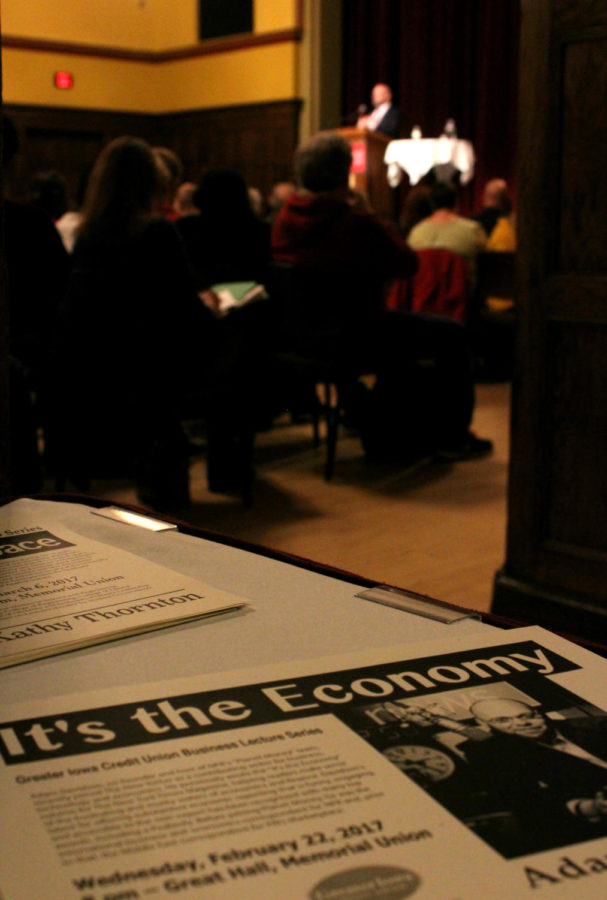NPR’s Planet Money co-founder discusses historical impact on today’s economy
Samantha Vaith/Iowa State Daily
Adam Davidson is an expert when it comes to economics. He wrote, “It’s the Economy” column in The New York Times Magazine. Davidson spoke in the Memorial Union Wednesday evening.
February 22, 2017
Many were drawn to the Memorial Union Wednesday evening to learn more about the man who co-founded and was once an international and business correspondent for the National Public Radio.
The lecture began at 8 p.m. in the Great Hall, where nearly 600 professors, students and parents attended.
Adam Davidson, co-founder and co-host of NPR show Planet Money, discussed the economic challenges that helped explain the current conditions of the economy.
He began by reeling back into 1879 with the invention of the ivory soap, which according to him is a defining moment for the current American world.
“The soap back then was made out of fat, it was disgusting. It smelled bad and all of sudden there was this new thing. It was 99.9 percent pure which meant a lot,” said Davidson. “Ivory soap took this thing made by lots of people all around the place and turned it into a standardized profit. It helped give rise to a massive corporation, Procter and Gamble.”
Davidson said the next key moment where the economy took a turn was in the early 1900s. It was a moment where the Dupont Corporation, run by the Dupont family at the time, created the idea of a job. It was the first time he believes that “real” jobs were created.
“If you go to the DuPont ledger, you’d see there were no job titles. It would be Frank McDonald and how much he got paid. It would be Phineas and how much he got paid. That’s it. No company was big enough that you need to know much [more about your employees],” he said.
Suddenly, Pierre Dupont started hiring people outside of the family which was revolutionary at the time. He created a hierarchy of job titles and tasks for each employee, thus, the birth of job titles ensued.
He dissected the impact these new revolutionary companies had in the economy.
For instance, Davidson said semi-literate people became major players in factory production. These semi-literates were suddenly inserted in mass production lines.
“When you have a country of semiliterate peasants and you put them into mass production factory and easily interchangeable jobs, you get a boost of productivity, an explosion of wealth that is unequal at any time in history. It happened here in [the] 1900s,” Davidson said.
Therefore, in the United States the principle of mass production and interchangeable jobs became a driving mechanism for the economy.
Davidson said a lot of countries, such as the Soviet Union and China, started adopting this system of productivity. He admitted that the only two narratives for countries to generate growth at the time were either through oil or mass production lines.
People started to have the opportunity to mass produce with the help of technological change.
“This is a moment the economist refer to as low skill biased technological change,” Davidson said.
The concept of low-skill-biased technological change was simply the idea of low-skilled people having to put in a lot of hours and suddenly being equipped with technological equipment.
He said that they are able to mass produce with lesser hours of work. Davidson infers that the drastic change in the operations of the economy raised individual expectations.
“The fact that you have in your head a mental model of your career path or you feel like a failure if you had to move back home to your parents makes you think it’s against human nature. It isn’t against human nature, it’s against the institutional structure that was built up over the course of a century,” Davidson said.
However, these psychological expectations declined in the 1979 because people started to believe that the government will provide a safety net.
Also, at the time, corporate strategy concepts were born for corporations to compete in the midst of technological change. Hence, corporations expanded which led to goods being distributed globally.
Today, companies and corporations switch strategies from mass producing to competing through using technologies that can hyper-target the right consumers.
“Today we see that value is not created in the mass aggregate. Value is created in hyper-targeting a specific number of people,” Davidson said.







